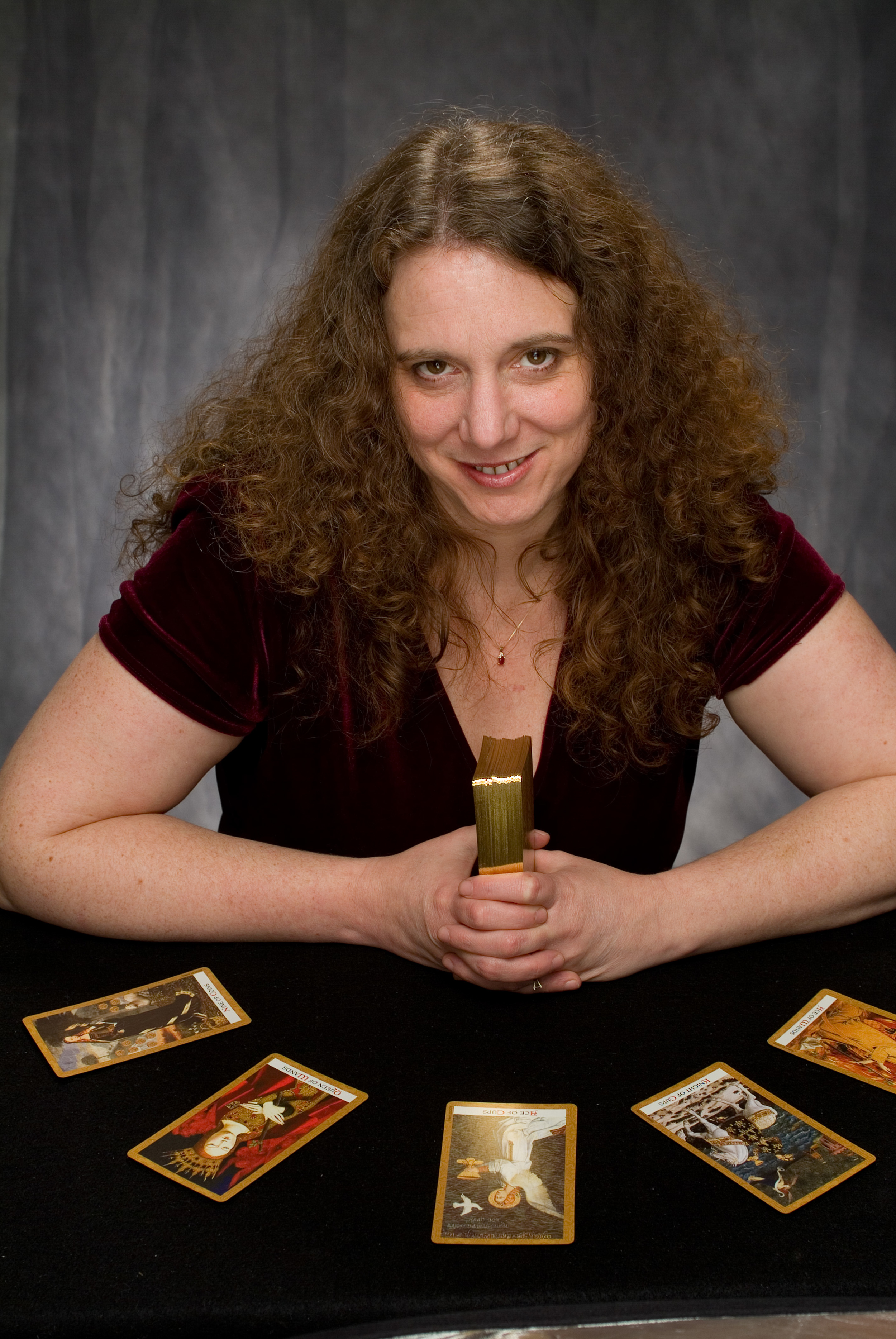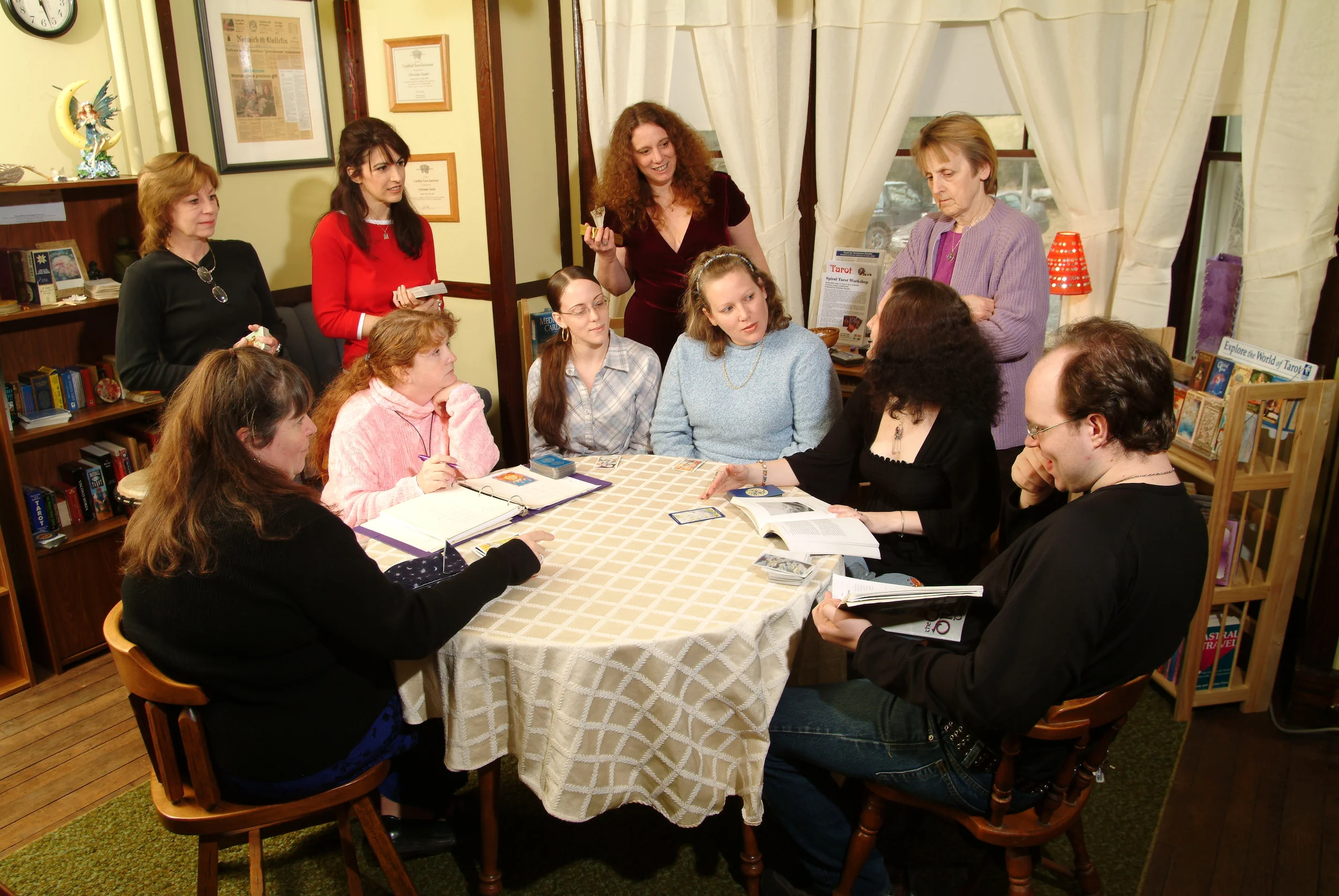
Welcome to my personal blog.
Here you will find my musings, thoughts and observations, all inspired by my experiences as a full-time professional tarot reader.
An Open Letter to Spiritual Seekers: Disillusion is Part of the Path
It is easy to become disillusioned with spiritual teachers, paths and communities. That's because your disappointment is an important part of your spiritual growth. If you are thinking about walking away from a path that you love, because of people whose behavior you don’t love, please think again.
Often on social media I am witness to the disappointment of spiritual seekers who have discovered the “dark side” of whatever modality or community they had previously embraced.
It might be a Roman Catholic who is fed up with abusive priests. It might be a tarotist who is disappointed by infighting. It might be a yoga student who got groped by the teacher in class. It might be a Wiccan who is tired of an ego-tripping High Priestess.
In each case, in each rant, blog post or tweet, I hear the same sentiments. “This is someone who should have known better.” “I expected more from someone in their position.” “Given the doctrine, this behavior is hypocritical”. In most cases, I agree. There are a lot of posers in every spiritual community, and most of them should indeed know better.
So often, the spiritual seeker goes away mad. They leave a path that has provided them something important, something vital, because they are disillusioned.
Sometimes, walking away is the right thing to do. Not every spiritual path is for every person. Not every community will resonate for you. Sometimes, tastes change, and that’s OK. Some leaders and teachers truly are frauds, and should be avoided.
But if you are thinking about walking away from a path that you love, because of people whose behavior you don’t love, please think again.
Whether we are talking about dance class or drum circle, any community that forms around creativity and spirituality will draw unto itself a wide variety of people, all of whom need healing. From those folks, teachers and leaders will emerge. Generally, those who show the most talent and find the most healing are the ones who take on leadership roles. Sometimes, however, the ones who have the largest egos, or the biggest insecurities, will be the ones with the drive for leadership.
Our leaders, our teachers, our priests and our gurus are human, too. The ones whose service is based on ego probably won’t serve you very well. The ones whose service is borne of a true desire to serve may still irritate and disappoint you, but they will serve you nonetheless.
The same is true of the dogma, doctrine and practices of our various modalities and traditions. Sadly, most of everything we are and do is in some way borne of something less than our desire for a great origin myth would prefer. The “ancient and mysterious” tarot began as a game only five hundred years ago. You probably won’t find much authentic Hindu practice in the yoga studio on Main Street. Wicca has been pretending to be an ancient religion since the 1950s.
But does any of this make tarot, or yoga, or Wicca, or any other creative, healing or spiritual pursuit less worthwhile? The answer depends completely on the seeker.
When you set out on your journey as a spiritual seeker, you enter into a contract with the Universe. You will find human teachers along your path, but your ultimate advisor on this course of study is the Universe itself.
The disappointment and disillusionment that you will inevitably find along the way is not meant to deter you from your spiritual path. The disenchantment that you experience is a necessary part of your spiritual path. Your disillusion may drive you away from a teacher or tradition that doesn’t appeal to you, or doesn’t feel ethical or appropriate. Your disillusion helps you define your path and your identity.
When you become frustrated with your teachers because they’ve let their humanity show, an opportunity for growth has presented itself.
When you see the mistakes your teacher is making, you recognize your own growth, and your own skill. Sometimes our most helpful teachers teach us what not to do, by example.
How you react to those mistakes is another opportunity. Can you gracefully step up and make a difference in your community, without disrespecting your teacher?
Can you accept your teacher’s authority, despite their capacity for error?
Can you break ties with a teacher or a community without drama or bad feelings?
The energy with which you take your next step will determine whether you have taken this opportunity for spiritual growth.
If a leader is clearly breaking the law, abusing people, or something equally heinous, react with the full weight of your anger and indignation, and contact the authorities.
If a leader is simply demonstrating their humanity, enjoy your opportunity to demonstrate your growth by acting in a way that honors people for where they are on their own path.
No human is perfect. Too many of us try to deify particular humans, so that we can place our trust in them. We mistake our spiritual journey as one where we must find our perfect teacher, or our perfect path, or our perfect community.
Progress on the spiritual path comes when we realize that those things can never exist.
Then comes clarity, where we can find value in our teachers, traditions and communities, even when we know the best and the worst about them.
So often, I hear people saying, “I think I have found the teacher (or path, or community) that won’t disappoint me.” My answer is, “I hope not!”
The only reason you would never be disappointed is if you never truly explored, never truly thought for yourself, and never truly grew. Exploration, introspection and self-determination are the goals of the journey. When we stop looking for perfection in others, we start finding peace within.
When we are disappointed with our teachers, it may be a sign of our own increased skill and knowledge. A good teacher knows this, and appreciates when it happens. A smart teacher will learn from her students, and let them pick up the tasks where they excel.
Disillusionment is the gift that replaces false expectations with true understanding., and allows us to embrace the nature and purpose of our humanity. Aren't those things all spiritual seekers are hoping to find?
The Purpose of Suffering
Everyone suffers in life at some point. Eventually, illness, disappointment and grief come to us all.
In those dark moments, many people wonder about the purpose of life, and the purpose of suffering.
Sometimes, in a tarot reading, I can see a specific purpose, or task, for a specific individual.
Often, in addition to those specific messages, there are messages that are more universal. That is, sometimes I receive messages that share a common theme.
After more than two decades of seeing and delivering these messages, the wisdom inherent in them is clear to me.
Forget what you read in the Old Testament.
I am convinced that Higher Power (God, Goddess, angels, Spirit, Source, Universe, etc.) does not ever makes us suffer as a way of punishing us.
This is hard for some people to believe. It’s true that sometimes our chickens come home to roost. That’s not God punishing us; that’s cause and effect.
When random terrible things happen in our lives, it’s easy to think that we have been singled out for punishment.
When we are frustrated in our inability to find that one elusive thing, the wonderful relationship or the dream job, we may become angry, believing that the Universe is withholding from us something we deserve.
Years ago, I took a Zen meditation class. The topic of the class was “Distractions.” The incense, I discovered, was not to enhance the meditation. The incense was there to provide a distraction; to make meditation more difficult. The more difficult the meditation, the more effective it would ultimately be.
Sometimes, our suffering is simply a distraction.
Higher Power’s goal is that we should enjoy creation. There is so much to experience and enjoy in a lifetime on the planet.
Sometimes our purpose is simply to find ways to enjoy and appreciate the gift of life, despite our suffering.
Once a person is able to be in that place of joy, more blessings are often added to that person’s life quite quickly.
Joy begets joy, especially in the face of suffering.
Seven Ways to Take Tarot to the Next Level Without Going Pro
This post is directed to a very specific group of tarotists. If you have taken tarot classes, studied tarot and fallen in love with tarot but don’t want to be a professional reader, this is for you.
Although I am a tarot professional, I often say that the best use of tarot is as a personal tool, rather than a professional one. Why do I say that? Because only a few of us will use tarot as a tool of our trade. However, everyone can benefit from tarot on a personal level.
There is so much to learn about tarot. We will all always be students. But there is something unique about that fascinating and exciting time when we first learn to read tarot. That moment when we realize the power and wisdom inherent within the cards, that moment when we realize we have come home to tarot, is a moment we always remember.
During that time of initial tarot discovery there are some students who drop away. The students who don’t enjoy or don’t have time for actual study, the students who just don’t resonate with the cards and the students who fail to find the spiritual component of tarot are often the ones who let their cards collect dust on the bookshelf. Some of them come back to tarot when they are ready.
But what happens to the student who has taken enough classes, read enough books and performed enough readings to be truly tarot-literate but doesn’t want to go pro? Many of them find themselves in a bit of a vacuum. They appreciate their connection to tarot but don’t know the next step. They don’t know how to incorporate tarot into their day-to-day lives. Sure, they will go to the cards when they or their friends have a problem to be solved. But tarot is more than a go-to for problem solving. Tarot is a spiritual path.
I wish we had a name for these tarotists. Since they are not professionals it would make sense to call them “amateurs.” But the word “amateur” carries with it a sense of “not good enough to be pro,” and that is not generally the case with these talented tarot enthusiasts.
When I wrote “Fortune Stellar” I spoke of going professional as a logical next step for a talented tarot enthusiast. But not every talented tarot enthusiast wants or needs to go pro.
If you are a talented tarot enthusiast unsure of your next step, here are seven ways to take tarot to the next level in your life.
-
Make a spiritual discipline of the COTD. When you were learning tarot perhaps you pulled a Card of the Day as part of your studies. Now you can pull a COTD as part of a spiritual discipline. Some people read scripture every day, some people do yoga every day. Do your COTD with that same sense of spiritual devotion. Let your COTD give you a spiritual message, or a lesson or focus for the day.
-
Interact with other Tarotists. Your tarot friends are your best friends because you speak the same language. Make an effort to join live tarot groups and online tarot groups. Attend tarot events when possible.
-
Read advanced Tarot books. You don’t need to read any more “How to Learn Tarot” Books, but there are many tarot books that are written from a spiritual perspective that will help you use tarot as a spiritual tool.
-
Use tarot to inspire creativity. If you are a writer, use the cards in character development and for plot planning. If you are an artist let tarot inspire your artwork. If you are a chef create tarot-inspired food!
-
Use tarot in your prayers, magick and manifestation. What is it you want in life? Use tarot images in vision boards, meditation, prayer and ritual to help you manifest what you want and need.
-
Use tarot in deep personal healing. Work with the tarot images in divination and mediation to help you identify and release your limitations.
-
Find tarot images and archetypes in your daily life. Tarot speaks to us everywhere we go. Be on the lookout for things around you that remind you of tarot cards, and embrace the cards’ wisdom when you see them.Tarot is a sacred text, as well as a game and a divination tool. Tarot is a way to find solutions and a way to help people. Tarot is also a way to learn the lessons of enlightenment, a way heal and a way to make sense of the world. You don’t need to be a professional reader to make tarot an important part of your life.
Tarot is a sacred text, as well as a game and a divination tool. Tarot is a way to find solutions and a way to help people. Tarot is also a way to learn the lessons of enlightenment, a way heal and a way to make sense of the world. You don’t need to be a professional reader to make tarot an important part of your life.
Three Examples of Hermetic Wisdom in Action
One of my favorite bits of spiritual wisdom is deceptively simple. The Hermetic “As Above, So Below” works in so many ways in our lives. I am constantly in awe of the power and knowledge that comes from those four words.
People often ask me to explain what “As Above, So Below” actually means. In a way, I am still figuring it out. Here are a five ways this wisdom presents itself to me.
-
Astrology
The movement of the heavens does not create situations on Earth. The movements of the heavens are reflected on Earth. As Above, So Below. -
We are Made in the Image of Higher Power
In virtually every religious paradigm there is a sense that humans are created as an image of deity. As Above, So Below. -
Success Comes From Spiritual and Mundane Action Together
When we want to achieve something we must pray, set intentions, do magick or make vision boards. We must create our success spirituality. At the same time, we must do the mundane work to support that success. One without the other doesn’t work very well. When our spiritual work and our mundane work support the same intention we are very likely to succeed. As Above, So Below. -
Spiritual Lessons come in Mundane Forms
Often we learn powerful spiritual lessons from the mundane events in our lives. For example, a person might achieve remarkable spiritual growth from the patience they learn when they break their leg. As Above, So Below. -
Mind over Matter
We’ve all heard the expression “mind over matter.” The idea is that our thoughts are powerful enough to influence physical things. Sometimes we can heal the body with the power of the mind. As Above, So Below.
Westerners often sense a disconnection between the mundane and the spiritual. As Above, So Below reminds us that our mundane and spiritual activities are inextricably connected.
Judgment
What is it about religion and spirituality that makes us feel comfortable judging and discriminating against those whose beliefs are different than our own?
It’s a complex issue. On some level we are all probably guilty of it. For instance, I have a problem with religions that disempower women and religions that try to make our human sexuality a source of shame.
At the same time, I am enraged when I feel I am being discriminated against for religious reasons, or am made to suffer because of someone’s misunderstanding of my own spiritual path.
Our guest on my webcast, Christiana’s Psychic Café, this Sunday was Jesse Ann Nichols George. She spoke eloquently about compassion, and about judgment as the antithesis of compassion.
For me a layer of complexity is added when I think about religion and spirituality as giving us a mandate for compassion, but also giving us permission to be judgmental. What a paradox!
Our need to judge each other seems to be the problem. “Judgment” is also a tarot card. Traditionally, Judgment references the Christian concept of the “Judgment Day” when each of us will be judged by God and reborn into heaven. Clearly, the only judging going on is by our Higher Power, not by humans.
The Judgment card also speaks of closure, endings and new beginnings. It advises us that our actions can be judged as worthy.
Is it possible that we sometimes judge others harshly because we have a hard time being forgiving toward ourselves?
What would happen if we each made a concerted effort to own our actions, but did it in a way that was loving, forgiving and accepting toward ourselves? Would that help us be more loving, forgiving and accepting of others?









